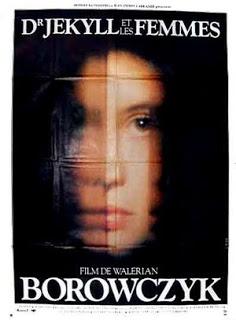
Directed By: Walerian Borowczyk
Starring: Udo Kier, Marina Pierro, Patrick Magee
Tag line: "Recourse to evil runs rampant against the laws of human restraint"
Trivia: Fanny Osbourne was the name of Robert Louis Stevenson's real life fiancée
Having already impressed me with his penchant for arthouse debauchery in The Beast and Behind Convent Walls, I was eager to see director Walerian Borowczyk‘s 1981 film The Strange Case of Dr. Jekyll and Miss Osbourne. And as it was with the other two movies, I was not disappointed.
Noted scientist Dr. Henry Jekyll (Udo Kier) is engaged to be married to the lovely Ms. Fanny Osbourne (Marina Pierro), and some of the most important people in London have been invited to a dinner party celebrating their impending nuptials. Among those in attendance are General William Danvers Carew (Patrick Magee) and his beautiful daughter Charlotte (Agnès Daems); The Rev. Donald Regan Guest (Clément Harari); Mr and Mrs. Enfield (Eugene Braun Monk, Catherine Cost) and their teenage daughter Victoria (Magali Noaro); and Dr. Lanyon (Howard Vernon), Dr. Jekyll’s mentor and a first-class surgeon.
What none of them realizes is that another guest will also be joining them: Mr. Edward Hyde (played by Gérard Zalcberg), Dr. Jekyll’s volatile, over-stimulated alter-ego. The result of one of Dr. Jekyll’s experiments, Mr. Hyde occasionally takes over Jekyll’s body, raping and killing every young woman he comes across (soon after Mr. Hyde makes his first “appearance”, the dinner guests begin to die in grisly fashion).
Hoping to ensure that her fiance is safe, Fanny sneaks into Henry Jekyll’s lab and, while there, learns the truth about his connection to Mr. Hyde. Can Fanny marry a man who is unable to control the darkness in his soul, or does she have a few demons of her own that will make her the ideal wife for both Jekyll and Hyde?
Using Robert Louis Stevenson’s gothic tale as a starting point, Borowczyk adds his own unique spin to the story (Fanny Osbourne was not in the novel; in reality, this was the name of Stevenson’s real-life wife, an adventurous woman whose tenacity impressed Borowczyk). And in so doing, the director creates a motion picture that is both perfectly refined (the various discussions that occur during the party, including a rather tense debate between Jekyll and Dr. Lanyon on the merits of metaphysical science, are well-scripted) and undeniably grotesque (the movie opens with the attempted rape and murder of an adolescent girl on the streets of London; and a scene in which Dr. Lanyon inspects the remains of a female guest, whose genitals were butchered beyond recognition by Hyde, proves difficult to watch).
Still, even with its more extreme elements (which includes Hyde raping one of the male dinner guests), The Strange Case of Dr. Jekyll and Miss Osbourne is more subtle – more restrained - than either The Beast or Behind Convent Walls. That is in no way a slight on this 1981 movie; as I already pointed out, it has its lewder moments. But the fact that Borowczyk also manages to engage his audience with dialog and an appreciation of the arts (along with a dance routine performed by Victoria, there’s a painting that sparks a spirited conversation among the guests) is a testament to his skills as a filmmaker.
Make no mistake: The Strange Case of Dr, Jekyll and Miss Osbourne will shock, and occasionally appall, you. But it will also stimulate your mind, and do so quite brilliantly.
